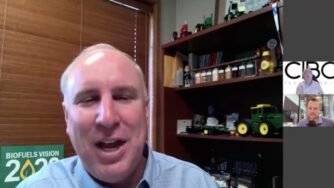When a company is evaluating their carbon footprint, it’s essential to understand the carbon emissions in your full supply chain. It’s important to have knowledge of your full supply shed or defined geographic area. In this recorded webinar, two CIBO team members – Jenette Ashtekar, SVP of Product Management, and Grant Ivison-Lane, Director of Agricultural Carbon, break down how to understand the carbon footprint, carbon intensity and potential effect of new-practice adoption of supply sheds.
We’ll cover:
- Why are organizations interested in offsetting their carbon footprint / scope 3 emissions
- How does CIBO’s Supply Shed function pull all the pieces of carbon confidence together
- What are the features and benefits of understanding a supply shed
- Walk through demo of CIBO’s Supply Shed function
Speakers:
- Jenette Ashtekar, SVP of Product Management at CIBO
- Grant Ivison-Lane, Director of Agricultural Carbon at CIBO
Key questions answered in the webinar include:
What is a supply shed?
It’s a geographical region from which commodities or products are sourced. What’s unique is that we don’t know every single individual piece of grain coming out of farm fields but we know which general region it comes from. A supply shed analysis allows us to understand the carbon intensity of a geographic area.
Companies who are manufacturing goods don’t always know what field or farm produced the pieces behind their product. A supply shed allows companies who know they are sourcing from a general area to help track the traceability of the carbon emissions.
The idea of traceability when it comes to emissions it’s very complex. In agriculture, it’s common to have crop rotations so fields who produce soy may produce corn the next year. However, they may be sourced from the same general area which would fall in the same supply shed.
Can you share the different aspects in how the variability of fields rolls up to a supply shed?
Today, supply sheds can be defined by a company to follow their sourcing. If a supply shed is defined broadly as a few states, it can include soil, weather, and practice variability. The CIBO platform can help capture the changes across those factors and incorporate it into the larger agriculture production. We’re able to capture the variability to show an aggregated supply shed value.
Can you elaborate on how supply shed analysis is growing in scope 3 emission reporting?
Companies are interested in making their supply sheds as efficient as possible when it comes to reducing carbon. What’s challenging is how to measure it and reduce it. Having the same measurement tools to evaluate a field level that rolls up to a supply shed is key.
Watch the webinar to see a demo of CIBO’s supply shed function in action!
Interested in learning more? Reach out to CIBO for a custom demo for your company today.
About Jenette Ashtekar
Jenette Ashtekar is the SVP of Product Management at CIBO, a science-driven software startup. Jenette Ashtekar is an entrepreneurial scientist and agricultural technology innovator experienced in translating and delivering novel IP into real world solutions. Jenette spent ten years as an academic soil scientist, modeler, and entrepreneur developing and commercializing algorithms that predict soil properties, water dynamics, and productivity from sub-field to continental scales. Her technology has been used to deliver critical soil information to at risk agricultural communities throughout central and south america as well as to help US and Canadian farmers improve precision management through the use of high resolution soil maps. Ashtekar is passionate about the translation of novel technology and academic IP into practical, real-world solutions and recognizes that the complex challenges facing agriculture today can only be solved through the collaboration and integration of many diverse stakeholders.
About Grant Ivison-Lane
Grant Ivison-Lane is the Director of Agricultural Carbon at CIBO. Grant is multidisciplinary with a background in ecosystem services assessment and greenhouse gas (GHG) accounting. Grant has seven years of experience supporting GHG inventories for large agricultural companies, market programs that generate Scope 3 GHG credits, standards advocacy, and CDP reporting in compliance with the GHG-Protocol Corporate and Scope 3 Standards. Grant developed some of the first agricultural inventories of GHG emissions in California’s San Joaquin Valley and also has applied ecosystem services frameworks to support decision-making on large, multi-stakeholder projects. Grant is passionate about ensuring the full breadth of societal benefits generated by agriculture are valued when we consider all that working lands can provide.



